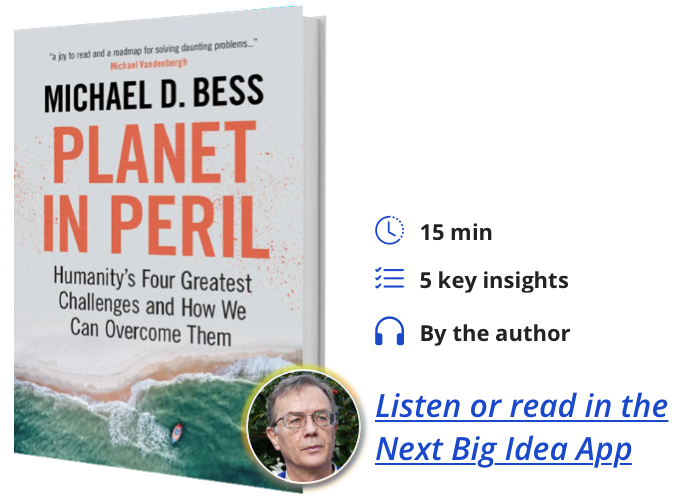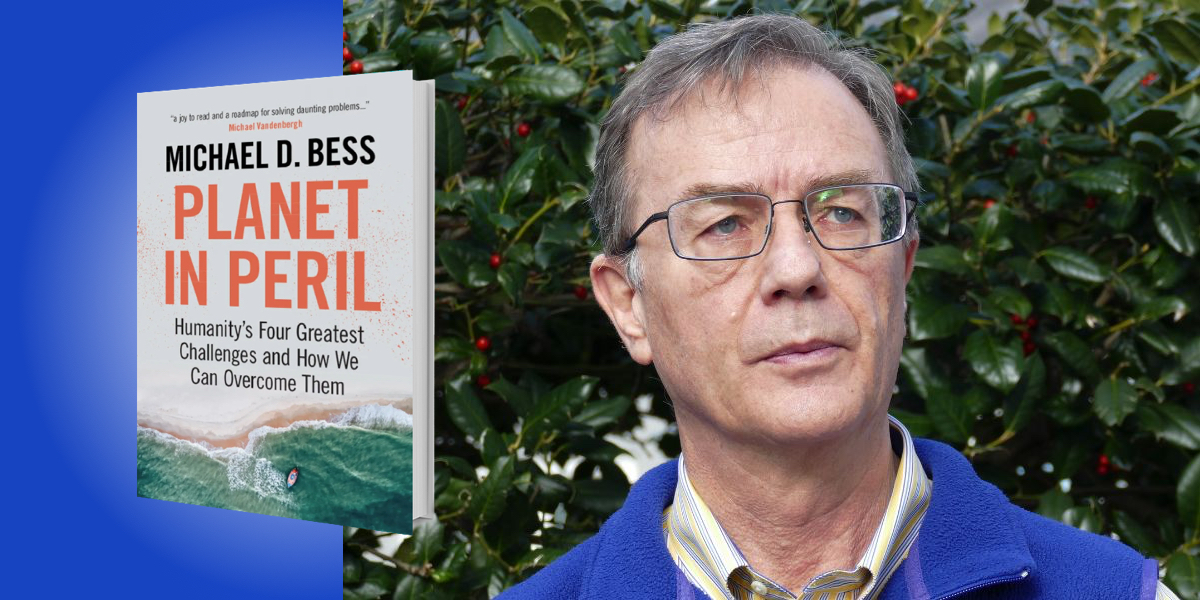Michael Bess is a historian of science and technology. He takes his specialized understanding of the past to draw dotted lines into the future, trying to see how today’s trends may play out over the coming decades. He is Chancellor’s Professor of History, as well as Professor of the Communication of Science and Technology, and Professor of European Studies, at Vanderbilt University.
Below, Michael shares 5 key insights from his new book, Planet in Peril: Humanity’s Four Greatest Challenges and How We Can Overcome Them. Listen to the audio version—read by Michael himself—in the Next Big Idea App.

1. Impactful, planet-level solutions are already being created today.
All four of the mega-dangers facing us—climate change, nuclear weapons, pandemics, and advanced AI—are global, so they will only be addressed successfully if humankind can come together in crafting planet-spanning solutions. The good news is that we are farther along in building global systems of coordination than most people realize.
A hundred years ago, all we had were the pathetically weak instruments of the League of Nations. Today, we have a multi-layered meshwork of institutions managing the interactions of the world’s peoples: from the United Nations and International Criminal Court to regional bodies like the EU; from business networks like the OECD and IMF to regulatory bodies like the World Health Organization; from anti-terrorist organizations like Interpol to military alliances like NATO; from grassroots groups like Greenpeace or Amnesty International to volunteer bodies like Doctors Without Borders and Oxfam. If someone made a timelapse of these interconnecting endeavors as they emerged over the past century, it would look like the self-organization of a young life form—a new creature assembling its sinews and nerves around the planet’s core.
“Today, we have a multi-layered meshwork of institutions managing the interactions of the world’s peoples.”
All these organizations and networks still have a long way to go, but it’s a mistake to underestimate how far we’ve come.
2. The United Nations has the potential to become a far more effective instrument.
The UN is a mess. The Security Council is outdated, with too many important nations excluded and the veto power of its five permanent members too often results in deadlock. I suggest a series of reforms that could gradually transform the UN into a far more effective tool for coordinating the most important endeavors of humankind. The long-term goals are:
- expanding the membership of the UN Security Council and eliminating the veto option
- developing a system of weighted voting in the UN, so that each nation’s influence in the global assembly more accurately reflects its population size and economic power
- reducing the disparities in wealth and opportunity that divide the world’s peoples
- introducing new checks and balances for keeping the UN system accountable and transparent in its operations
- building robust instruments of collective military security and economic sanctions, capable of dealing decisively with rogues, cheaters, or fanatics
In this revamped UN, existing national governments would continue doing most of the day-to-day running of peoples’ affairs. Only the truly global matters such as military security, climate change, or regulating dangerous technologies would be assigned for coordination by the UN.
3. The power of purposeful, incremental change.
Some of the most profound transformations of the modern era have come about gradually, through the dogged efforts of successive generations of committed individuals.
“Technological achievements, such as the telephone, that seemed fanciful two centuries ago became conceivable a century ago, then a reality 50 years ago.”
It turns out that the realm of the possible is not a stable place: it changes from decade to decade, as habits, expectations, and assumptions evolve. Technological achievements, such as the telephone, that seemed fanciful two centuries ago became conceivable a century ago, then a reality 50 years ago. Societal achievements deemed utopian in 1850, such as equality for women, have started becoming legally the norm in recent decades and are on their way to becoming a socioeconomic reality.
Both these examples illustrate the transformative power of small, purpose-driven innovations. Seemingly modest changes are a lot like compound interest: they can accumulate remarkably over time, yielding quietly revolutionary results.
4. Major positive transformations in society can happen in the absence of full consensus.
Let me illustrate this with two historical examples.
In 1950, the West European nations were still reeling from the catastrophe of World War II, this after centuries of distrust, rivalry, and conflict. Yet four decades later, in 1992, these nations signed the Maastricht Treaty, binding themselves together in a partial supranational union. War among the West European nations became about as likely as armed aggression between the United States and Canada. This was achieved by ten thousand small, incremental steps, pushed along by several successive generations of devoted citizens and leaders.
A second encouraging example lies in the green movement. The environmentalists of the 1960s tackled a daunting challenge: how to persuade their fellow citizens to transition into a more ecologically sustainable way of life. Their efforts were fiercely opposed by powerful and politically well-connected groups. And yet, seven decades on, you’d be hard pressed to find a single aspect of modern industrial economy that remains untouched by green innovations. From cars to cosmetics, education to business, everything is subject to considerations of sustainability. Our economic system is certainly not as green as the activists of the 1960s had hoped, but it’s far greener than it would have been if they had thrown up their hands in resignation.
We should not be discouraged by the daunting nature of the political and diplomatic challenges facing us at the global level. We can roll up our sleeves today and work on modest changes that will gradually accumulate, taking us incrementally into a different international system.
5. Dictatorships and democracies can work constructively with each other.
How would a reorganized UN work, in practice, when some states are democratically governed while others are despotic or authoritarian? Here, I draw inspiration from the Cold War relationship between the United States and Soviet Union, in which the rivalry was both geopolitical and ideological.
“Now, with pandemics and climate change vividly on our minds, still more people are seeing the need for planet-level instruments of governance.”
Yet, these archenemies did not go to war. As the decades went by, they eventually set up a tacitly agreed upon playbook of rules for dealing with each other. By the time of the Intermediate-Range Nuclear Forces (INF) treaty in the 1980s, they’d accepted limited mutual inspections of each other’s military installations, in the interest of maintaining stability and arms control.
It’s possible that something analogous could emerge as a basic principle for nations coexisting under a revitalized UN. Many of those nations would not like each other. Many would be profoundly different in the ways they run their societies back home. But if they perceive it to be in their national interest to do so, can they not learn to play by a common set of rules? And could this not become the basis for a far more active UN role in coordinating policies and decisions?
The mentalities of humankind began changing a hundred years ago, as the horrors of World War I impressed themselves on thoughtful people. They changed even more drastically with the trauma of the Second World War and the grim prospect of nuclear holocaust. Now, with pandemics and climate change vividly on our minds, still more people are seeing the need for planet-level instruments of governance.
As these planet-level pressures continue to escalate, more people will question narrow, constricted nationalisms. Whether they like it or not, they’ll be compelled to seek ways to work constructively with strangers on other continents, and this will require new institutional tools that bridge the gaps between them. It will also demand new mental frameworks for thinking about who we are and how we draw boundaries around ourselves.
It comes down to ongoing choices that we will make, and that our descendants will make. It’s very important to realize that these are choices, not fixed or preordained pathways. The future is more open than people tend to think.
To listen to the audio version read by author Michael Bess, download the Next Big Idea App today:































